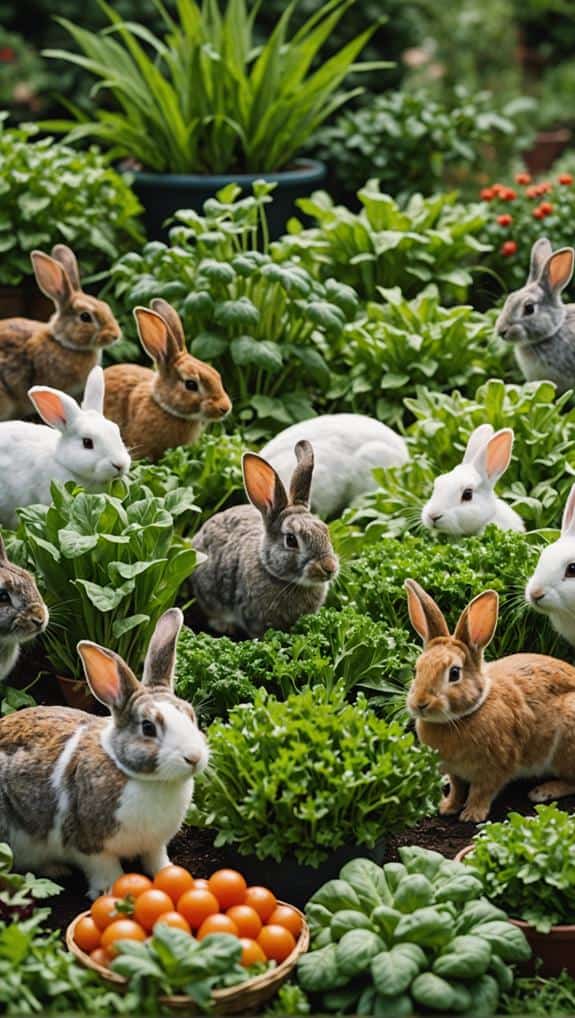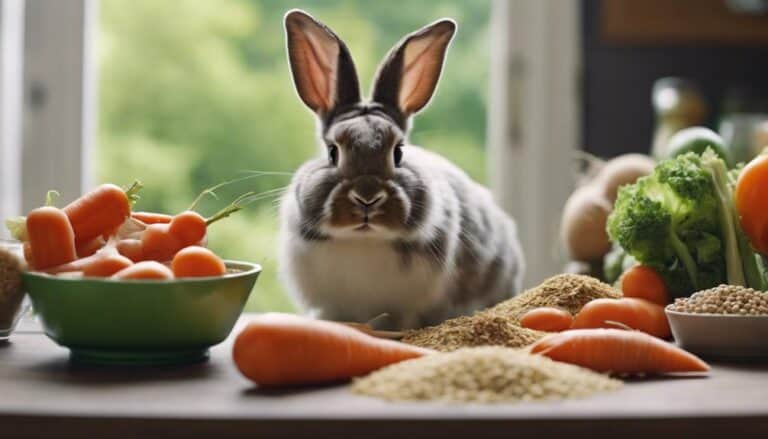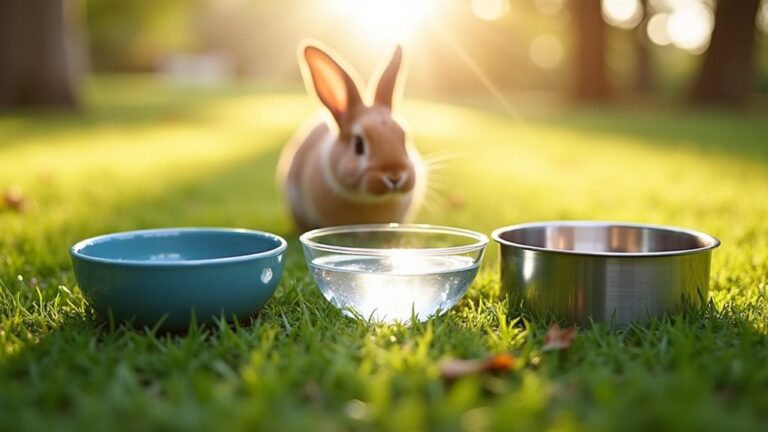Did you know that the vitamin and mineral needs of rabbits can vary greatly between breeds? You might be surprised to learn how factors like size and life stage influence their dietary requirements. For instance, larger breeds may thrive on higher calcium and protein, while smaller ones could face health issues if given the same diet. Understanding these nuances is essential for ensuring your rabbit's well-being, but there's much more to explore regarding specific needs and common deficiencies among different breeds. What adjustments might be necessary for your pet's best health?
Contents
- 1 Overview of Rabbit Breeds
- 2 Unique Nutritional Needs by Breed
- 3 Vitamins Essential for All Breeds
- 4 Mineral Requirements Across Breeds
- 5 Dietary Adjustments for Size Variations
- 6 Age-Specific Nutritional Considerations
- 7 Impact of Metabolic Rate on Diet
- 8 Common Deficiencies in Pet Rabbits
- 9 Best Practices for Breed-Specific Feeding
- 10 Final Thoughts
Overview of Rabbit Breeds

When considering the vast world of rabbit breeds, how do their unique characteristics shape their care requirements? With over 300 recognized breeds, each one has distinct traits that influence care, particularly regarding diets. For instance, compact breeds like the Mini Rex and Holland Lop need careful management of their rabbit diets to prevent obesity-related issues; a balanced maintenance diet is vital.
These breeds require specific essential amino acids and vitamins, including vitamin E, to maintain their health. Additionally, breeds with unique eye colors, such as the blue-eyed Mini Lop, may have specific visual health considerations that could impact their dietary needs.
In contrast, larger breeds such as the Flemish Giant and New Zealand White have heightened nutritional needs due to their size and growth rates. Their diets must be rich in protein and calcium to support their rapid development.
Additionally, breeds like the Rex, known for their unique fur types, may have increased vitamin E requirements to promote a healthy coat.
It's important to recognize that breeding and lactating does, regardless of breed, require diets high in calcium and phosphorus to guarantee proper fetal development and milk production.
Understanding these variations in care allows you to provide tailored nutritional support, ultimately fostering the well-being of each rabbit breed.
Unique Nutritional Needs by Breed
Rabbit breeds exhibit distinct nutritional needs that reflect their varying growth rates, metabolic demands, and predispositions to health issues. For example, cross-bred rabbits tend to have a broader gene pool, which may influence their overall health and nutritional requirements, making it vital to understand their specific needs for ideal care. Understanding these differences helps you provide the best care for your rabbits.
- Larger breeds like the Flemish Giant require higher protein levels (14-16%) and fiber (up to 20%) to support their mass, while smaller breeds, such as Netherland Dwarfs, do well on lower amounts.
- Breeds prone to dental issues, like the Lionhead, benefit from increased fiber to promote healthy chewing and prevent malocclusions. This is imperative, as health and longevity of rabbit breeds can be greatly impacted by their dietary choices.
- Pregnant and nursing does, particularly in breeds like the English Lop, need enriched diets with high-quality hay and concentrated pellets to support lactation and kit growth.
Additionally, breed-specific calcium needs are vital; those predisposed to urinary issues should have lower calcium diets to avoid complications like urinary stones.
Including B vitamins and vitamin K in their diets can also improve overall health. By tailoring their nutrition to these breed-specific requirements, you help guarantee your rabbits thrive and maintain ideal health.
Vitamins Essential for All Breeds

Vitamins Important for All Breeds
Vitamins play an important role in maintaining the overall health and vigor of rabbits across all breeds. Understanding the specific vitamin requirements helps guarantee that your rabbits thrive. Key vitamins include vitamin A, D, E, and the B complex. A well-balanced diet rich in these vitamins not only supports ideal health but also helps prevent common issues like obesity and dental problems, which can arise from nutritional deficiencies a balanced diet.
Vitamin A is crucial for vision and reproductive health, confirming your rabbits can see well and reproduce effectively. Vitamin D is essential for calcium absorption, which supports strong bones and skeletal development, preventing issues related to nutritional deficiency.
Meanwhile, vitamin E serves as a powerful antioxidant, safeguarding cells from oxidative damage and playing a notable role in normal reproductive function.
The B complex vitamins are important for energy metabolism. Fortunately, rabbits have a unique ability to synthesize additional B vitamins through cecotrophy, where they eat their cecotropes to absorb nutrients more effectively.
A balanced diet typically meets these vitamin needs, but always be vigilant for signs of nutritional deficiency. If you notice any health issues, consider evaluating their diet or incorporating supplements as necessary.
Guaranteeing your rabbits receive these essential vitamins will appreciably contribute to their overall health and longevity.
Mineral Requirements Across Breeds
When it comes to mineral requirements, different rabbit breeds demand tailored nutritional approaches. Certain breeds, for instance, may require higher levels of specific minerals such as calcium and phosphorus to support their bone health, while others might thrive on a more balanced ratio. It’s essential to monitor their dietary intake closely, as mineral deficiencies in pets can lead to serious health issues, including weakened immunity and dental problems. Consulting with a veterinarian can help to ensure that the nutritional needs of each breed are met effectively.
Larger breeds typically need more calcium for their skeletal development, while smaller breeds may require less.
Additionally, understanding the calcium-to-phosphorus ratio is vital, as this balance can vary based on each breed's metabolic needs and health considerations.
Breed-Specific Nutritional Needs
Understanding the specific mineral requirements of different rabbit breeds is essential for ideal health and development. Each breed has its unique breed-specific nutritional needs that dictate the appropriate levels of calcium, phosphorus, and other minerals in their diets.
- Larger breeds like Flemish Giants need higher calcium intake for proper skeletal development.
- Pregnant and lactating does require elevated calcium levels to support fetal growth and milk production.
- Breeds predisposed to urinary issues, such as the Mini Rex, benefit from lower calcium diets.
When formulating dietary plans, it's important to adjust the mineral content based on the breed's specific needs.
For instance, while all rabbits should maintain an ideal calcium-to-phosphorus ratio of 2:1, larger breeds may necessitate higher phosphorus levels, especially in meat-focused breeds like New Zealand Whites, which support muscle development and growth rates.
Calcium and Phosphorus Ratios
Different rabbit breeds require specific calcium and phosphorus ratios to maintain ideal health and development. For instance, larger breeds need higher calcium levels during their growth phases, which is vital for robust skeletal development. In contrast, smaller breeds can suffer from urinary issues if they consume excess calcium.
The preferred calcium-to-phosphorus ratio for rabbits should be around 2:1, especially during growth and reproductive stages.
Alfalfa hay, rich in calcium, can be beneficial for growing breeds but should be limited for adults to avoid urinary complications. Mature rabbits, particularly smaller breeds, thrive on a lower calcium diet, ideally around 0.4-0.5%. This helps reduce the risk of kidney damage and the formation of urinary stones.
Monitoring urine color serves as a practical tool for evaluating calcium balance. Creamy white urine often indicates excessive calcium intake, while clear urine suggests a healthier balance.
Dietary Adjustments for Size Variations

Nutritional balance is crucial for maintaining the health of rabbits, especially considering the significant size variations across breeds. Adjusting their diet according to size guarantees each breed receives the right levels of protein, fiber, and calcium.
For giant breeds, aim for a diet containing 14%-16% protein and at least 18% crude fiber. This helps prevent obesity and supports proper digestive health.
In contrast, smaller breeds often require a higher protein concentration of around 16%-18% to match their faster metabolism and growth rates.
When it comes to calcium, adjustments are essential. Smaller breeds can handle lower calcium levels (approximately 0.4%) to minimize urinary issues, while larger breeds benefit from balanced calcium intake (about 0.5%) for optimal bone health.
Be sure to monitor body condition and health closely during any dietary changes, as both under-nutrition and over-nutrition can lead to complications.
- Adjust protein levels based on breed size.
- Guarantee adequate fiber to support digestion.
- Tailor calcium intake to prevent urinary problems.
Age-Specific Nutritional Considerations
As rabbits age, their nutritional needs evolve considerably, requiring tailored adjustments to their diet.
Young rabbits demand higher levels of minerals, particularly calcium and phosphorus, with a prime calcium-to-phosphorus ratio of 2:1 to support their skeletal and dental development.
When caring for pregnant does, make certain their rabbit feeds are rich in protein and calcium, ideally comprising 50% alfalfa hay, to nourish both them and their developing kits.
For lactating does, an adjusted diet of 40% alfalfa hay, along with increased protein and energy, is essential for effective milk production and the growth of their young.
As rabbits shift into adulthood, focus on providing a balanced diet to facilitate efficient absorption of calcium and phosphorus, while avoiding excessive calcium to prevent urinary issues.
For aging rabbits, consider a diet lower in calcium and protein, as their metabolic needs decrease, which helps prevent obesity and renal disease.
Incorporating high water intake is important across all ages, making sure they remain hydrated and healthy.
These age-specific nutritional considerations are significant for maintaining ideal health at every stage of a rabbit's life.
Impact of Metabolic Rate on Diet

Rabbits' metabolic rates greatly influence their dietary needs, making it crucial to tailor their nutrition based on individual circumstances. Understanding these metabolic demands helps you provide ideal care and guarantee your rabbit thrives.
For instance, a rabbit's basal metabolic rate (BMR) varies depending on size and health, and during growth or recovery, their nutrient requirements can markedly increase.
- Illness can elevate BMR by 1.2-2.0 times, necessitating adjustments in nutritional intake to support recovery.
- Growth periods can raise BMR by 1.5-3.0 times, demanding higher protein and caloric intake for proper development.
- Starvation can lower BMR to 0.5-0.9 times the standard rate, reducing nutrient needs until health stabilizes.
Common Deficiencies in Pet Rabbits
Pet rabbits often face vitamin A deficiencies, which can compromise their immune function and overall health.
Additionally, calcium imbalances pose significant risks, as too little calcium weakens bones while too much can lead to urinary problems.
Understanding these deficiencies is essential for ensuring your rabbit's diet supports their well-being.
Vitamin A Deficiency
Vitamin A deficiency is a significant health concern for rabbits, impacting their overall well-being and quality of life. This nutrient plays an important role in maintaining healthy epithelial tissues, and its absence can lead to serious ocular issues, including conjunctivitis and vision impairment.
To guarantee your rabbit thrives, it's important to provide a balanced diet that meets their vitamin A needs. Here are some key points to take into account:
- Fresh leafy greens, such as kale and dandelion greens, are excellent sources of provitamin A (beta-carotene).
- Rabbits require approximately 50-100 IU of vitamin A per kilogram of body weight daily to prevent deficiencies.
- Regular veterinary check-ups can help identify early signs of vitamin A deficiency.
Symptoms of vitamin A deficiency may include poor coat condition, increased susceptibility to infections, and a weakened immune system.
By incorporating fresh vegetables into your rabbit's diet and monitoring their health, you can help maintain ideal vitamin A levels.
Calcium Imbalance Risks
A calcium imbalance poses considerable risks to the health of rabbits, often resulting from dietary mismanagement. Pet rabbits are particularly susceptible to conditions like urinary stones and renal disease due to excessive calcium intake. High calcium diets, frequently stemming from over-reliance on alfalfa hay, can lead to visible chalky urine, indicating an overload of this mineral.
To maintain ideal health, adult rabbits require calcium levels between 0.4% to 0.5% of their daily diet. Any excess calcium can accumulate, potentially causing renal damage over time. If left unchecked, this can escalate into severe health complications, including kidney failure.
Therefore, it's important to monitor your rabbit's diet closely to prevent a calcium imbalance. Regular veterinary check-ups are essential for evaluating calcium levels and ensuring a balanced mineral intake that aligns with your rabbit's specific life stage and health status.
Best Practices for Breed-Specific Feeding

Considering the diverse nutritional needs of various rabbit breeds is essential for ideal health and development. To optimize your rabbits' diet, it's significant to tailor their feeding according to breed-specific requirements. Here's how to approach it:
- Adjust protein requirements: Larger breeds may need 14-16% protein during growth, while smaller breeds might require 16-18% due to higher metabolic rates.
- Manage calcium needs: Breeds like the Mini Rex, which are prone to urinary issues, benefit from lower calcium diets to reduce hypercalciuria risks.
- Prioritize fiber content: Make sure your pelleted diets maintain over 15% fiber, while avoiding excess starch to prevent gastrointestinal issues, especially in delicate breeds.
Incorporating vitamins A and D into your rabbits' diet is essential, especially for those susceptible to skeletal issues.
Young rabbits should consume approximately 50% alfalfa hay for enhanced growth support, rich in phytonutrients.
Final Thoughts
In summary, understanding the unique vitamin and mineral requirements of different rabbit breeds is essential for their health and well-being. Just like a knight needs the right armor for battle, your rabbits thrive on tailored nutrition that meets their specific needs. By adjusting their diets for size, age, and metabolic rate, you can prevent common deficiencies and guarantee your furry companions flourish. Remember, a well-fed rabbit is a happy rabbit, ready to hop into a healthy future!






